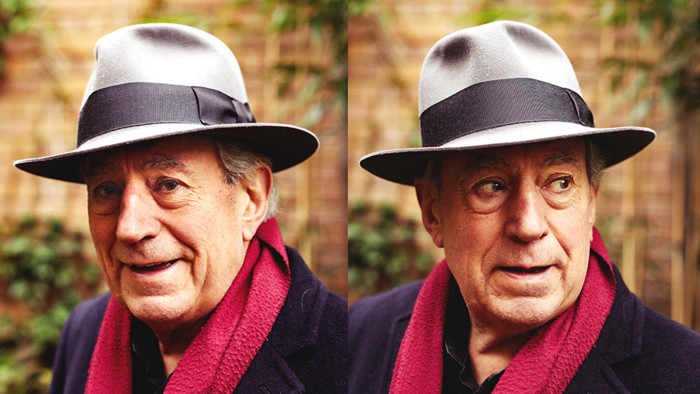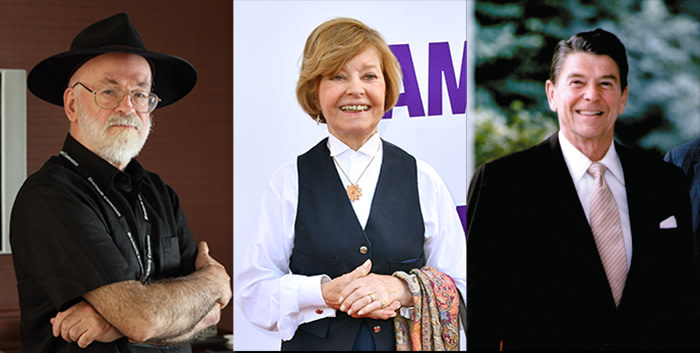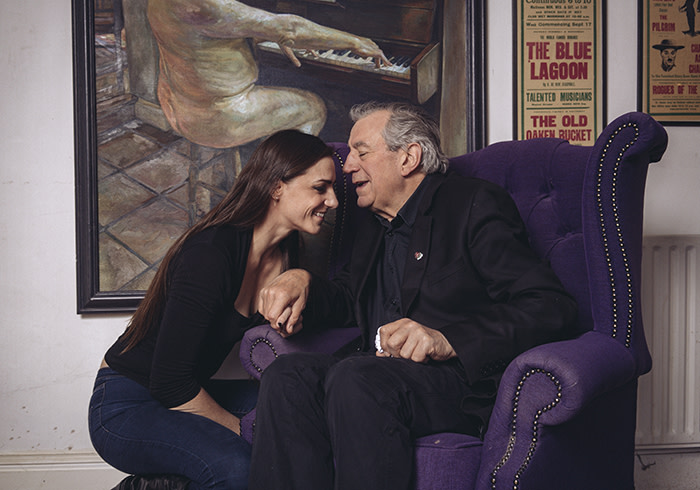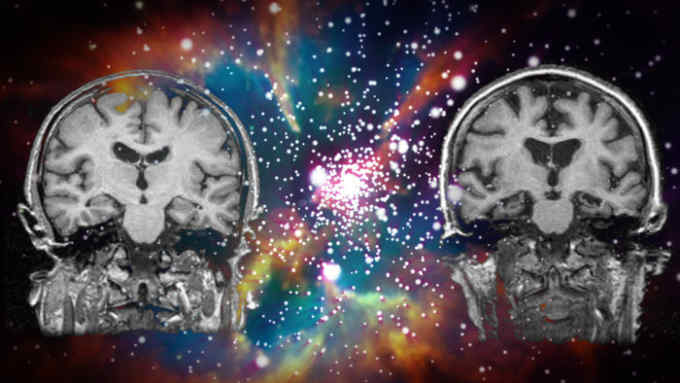How Alzheimer’s emerged from the shadows
Roula Khalaf, Editor of the FT, selects her favourite stories in this weekly newsletter.

This story is part of the Financial Times Seasonal Appeal for Alzheimer’s Research UK, which is raising funds for pioneering research to develop new treatments for dementia. You can support the appeal here
I remember my grandmother’s descent into dementia. Senile dementia, we called it then. The grandma I had known — never less than immaculately coiffed and dressed, a shrewd and knowledgeable collector of antiques, and a baker of puddings so sublime I can taste them to this day — slowly disappeared into the netherworld of senescence.
To my shame, I felt embarrassed and tongue-tied as her confusion took hold. But this slow extinction of personality, I was told, was a natural consequence of ageing.
That was 40 years ago. Today, dementia is the condition we fear the most and, according to figures for the UK released last month, the one from which most of us will die. Yet rather than being robbed of a voice, those living with the condition are insisting on their continuing humanity even as they lose the very faculties that most define us as human. The emergence from the shadows of this terrifying disease reveals how far attitudes to ageing and illness have changed in the developed world — and it is sowing the seeds of a movement that may one day lead to a cure.
The Che Guevara of this social revolution was Terry Pratchett, who, in 2008, stood up at an event organised by Alzheimer’s Research UK and told the world that, at just 59, he had a rare, early-onset form of the disease.
He was not the first to go public with a dementia diagnosis. Ronald Reagan did so in 1994, five years after he stepped down from office, the latest in a line of presidents and their consorts — Franklin Roosevelt with polio, Betty Ford with breast cancer — to use the pulpit of the White House to speak openly about a serious disease in an attempt to loosen its chilling hold on the public imagination.
After issuing this statement, however, Reagan retreated, as if in the final frame of a movie, vowing mellifluously to “begin the journey that will lead me into the sunset of my life”. We were spared a continuing sense of the devastation the disease would wreak.
Pratchett was different. If illness is a foreign country to all but its reluctant inhabitants, the fantasy writer was the first to send back regular dispatches describing the scenery and topography of a hitherto uncharted condition.
Through his speeches and interviews, we discovered that his particular form of the disease affected his ability to process visual information, but not his reasoning nor, crucially, his command of language: the prolific writer’s final novel was published almost six months after he had died. Others have followed his example of openness, including Timothy West and Prunella Scales, veteran British actors who described their travels around Europe on canal boats in a weekly television series, despite Scales’ advancing dementia. It was less a travelogue than a moving portrait of their long marriage, each episode carrying the subliminal — and in its own way subversive — message that mutual attraction and respect will outlast cognitive decline.

For Pratchett, publicly describing his disease had a talismanic power. “I remember when people died of ‘a long illness’; now we call cancer by its name, and as every wizard knows, once you have a thing’s real name you have the first step to its taming,” he said.
The single most important shift in our attitudes to Alzheimer’s, and other forms of dementia, was the discovery that it was an illness rather than an inexorable consequence of ageing.
This becomes all the more apparent to me when I visit Martin Rossor, national director for dementia research at the UK’s biggest funder of health research. Rossor began his clinical research in 1979, within a year of my grandmother’s death; he is now one of the country’s foremost experts in Alzheimer’s.
As we talk in his book-filled office at University College London, he points to a shelf containing a bound copy of his 1982 thesis, its title clearly visible on the spine: The Neuro-Chemistry of Senile Dementia. That tag — “senile dementia” — determined the cultural tropes that for so many years surrounded the condition, encouraging a sense that medicine was powerless to alter its course. “We’ve been burdened with Shakespeare’s Seven Ages of Man, [King] Lear, Gulliver’s Travels with the [immortal but ageing] Struldbrugs,” says Rossor. “All of these [convey] the image that as you get older everything declines and you end up a vegetable — and that’s been unhelpful.”
The illness was first reported in 1906, when Professor Alois Alzheimer noticed changes in the brain tissue of a woman in her mid-fifties who had died of an unusual mental illness. Her symptoms included memory loss, language problems and unpredictable behaviour. Using advances that had emerged from the German dye industry, he stained the brain tissue and discovered the plaques and tangles that characterise the disease. Originally the illness was seen as one of middle age, says Rossor. “Then people recognised that the changes in the brain, the deposition of proteins to form the plaques and tangles, is seen in the elderly senile dementia person, so that shifted the terminology.”
It is hard to divorce the stasis that ensued for six decades after the disease was first identified, when little research was carried out, from the view of older people that pervaded society and medicine throughout those decades.
Even when Rossor qualified as a doctor in the early 1970s, “once somebody was 60 or 70, the idea you’d start doing a heart valve replacement or a kidney transplant didn’t really happen . . . But now you will do minimally invasive surgery [on people] in their nineties.” The notion of “living with dementia”, just as people live with cancer or HIV, has similarly entered medical terminology, which “has also helped our view of ageing”, he says.
It is 20 years since the first chemotherapy-and-all cancer memoirs were published. When Ruth Picardie, the British writer, described in a weekly newspaper column the breast cancer that meant she would not see her toddler twins grow up, or John Diamond, a British journalist, insisted that “cowards get cancer too”, they illuminated the human toll of a disease that for so many years had been cloaked in euphemisms, a diagnosis often kept even from those affected themselves.
On the face of it, those talking about dementia are simply following in
their footsteps. Prof Rossor, however, argues there is something distinctive — and distinctively courageous — about the decision to speak publicly about having Alzheimer’s. “There’s always been this worry that because you’re robbed of your cognition, somehow your comments, your views, your status are diminished much more than [with] cancer. So I think there is something about this that is different.” He quotes a favourite maxim from La Rochefoucauld: “Everybody complains of their memory but none of their judgment.”
I reflect on this as I walk down a leafy lane in Highgate, a prosperous area of north London, to visit Terry Jones (pictured at the top of this story), the Monty Python star whose exquisite sense of the absurd, first encountered when I was 12, seemed to beckon to me from the world of adults, offering reassurance that I would not always be bound by the constraints of middle-class suburban life.
In 2016 he announced that he had a rare condition called frontotemporal dementia. As I arrive at the ranch-style home he shares with his wife Anna Soderstrom and their young daughter, he is standing in the hallway, a tall and erect figure, as he must so often have stood to greet guests before his illness took hold.
The 75-year-old shakes my hand firmly and gives a smile of welcome — and it is not until we are seated at high stools around the kitchen table, in a room bathed in late autumn sunshine, that I realise how far his illness has robbed him of language. “Yes” and “no” are the only words that he easily utters. Yet the atmosphere is warm and positive. This is transparently a happy family home whose occupants — like so many who must deal with serious disease in a loved one — have valiantly adapted to a new normal.
Jones turns an alert and engaged gaze on me as we talk. Anna gently prompts in response to my questions, clearly keen to confirm that she is answering as he would do himself, if aphasia brought on by the disease had not made it hard for him to form the words.
Tell us your story
Has someone in your family been affected by Alzheimer’s?
Tell us about your experience with the disease here.
Join Dementia Research
Anyone can help. Click here to find out how
Asked why they had decided to talk publicly about his condition, her answer blends altruism with the couple’s own powerful need for support and understanding. “It’s important to help if you can and it also helps us that people understand our situation,” she says. “And if other people are in the same situation, and it helps them to hear about it, then that’s what we ought to do.”
Everyone, she adds, has their own journey through the illness. The hardest thing is living with the uncertainty about what will come next, “in small things and in big things”. Relationships are built and maintained on our ability to share our subjective realities: it is the defining quality of being human. Yet many people with dementia lose the capacity to explain what they are thinking and feeling, even to those closest to them.

When I suggest that it is important to let people know how it feels to suffer from the condition, Anna says: “Only you can answer that, Terry.” Later, as Terry heads off for a walk — he covers several miles of Hampstead Heath a day — I ask her if he feels fearful. “I suppose I have to just refer you to your impression of him today. All we can do is give him the best quality of life that we can.
“He has a range of things he does during the day and still enjoys and that’s wonderful to see.”
Mike Kelly, senior visiting fellow in Cambridge university’s Institute of Public Health, is part of a niche academic sub-specialism: a medical sociologist who has spent decades studying how people respond to serious illness.
In earlier times, when self-disclosure was frowned upon, people who contracted chronic diseases attempted to present a normal front, while privately struggling to manage the problems and indignities imposed by their conditions. The result, he says, was a discomfiting dissonance.
“This front-stage-backstage or onstage-offstage was one of the things which numerous investigators, in a whole range of chronic conditions, noticed. I’m talking about the 1940s, 1950, 1960s, [when] talking about one’s emotions was, in polite society, frowned upon, very significantly.”
Now, a confessional culture has changed the rules, allowing even those with a condition such as dementia to control their own reality, maintaining a sense of self that encompasses, but is not limited to, their disease.
“Disclosure about all sorts of things is much more acceptable than, say, 40, 50 years ago — [the era of] the stiff upper lip . . . certainly in the United States, Canada, Great Britain, western Europe, Australia, New Zealand.”
He points to the late Glen Campbell, the country and western singer, who continued to tour after his Alzheimer’s diagnosis, his experiences chronicled through a documentary that candidly exposed the reality of living and dying with the disease. Deciding to share his story so publicly meant it was “on his terms rather than on the terms dictated by the illness or dictated by others labelling or stigmatising or [having] other kinds of responses to the condition,” argues Kelly.
Later, when I telephone Ashley Campbell, the singer’s musician daughter, who is performing at a conference on dementia in Wichita, Kansas, she confirms that it was his determination to keep touring that led him to speak out about his diagnosis. “For my dad, at first it was really a matter of [just wanting] to keep playing music and he didn’t want to let the disease stop him, and in order to do that he had to be honest with his fans and the crowd.”
Creativity survived even as the degenerative disease took hold. Not only did he continue to perform; he also co-wrote a song about his condition — “I’m still here, but yet I’m gone/ I don’t play guitar or sing my songs” — and delivered his own musical elegy in the shape of a final album less than three years before he died. Did the illness make its own contribution to Campbell’s creative process? Ashley says: “In a way it became kind of freeing for him. He always jokingly said, ‘Alzheimer’s? Well, good, I’ve been trying to forget a lot of stuff!’ So maybe sometimes when there’s something that you can’t control, it almost gives you freedom to let go and weather whatever comes.”
An illness that utterly defies attempts to find both cause and treatment seems an impertinence in an information-saturated age. Many cancers are on the way to being if not conquered then at least held in check; treatments for HIV have commuted the effective death sentence of the 1980s into a condition with a normal life expectancy.
When I think of all those dedicated investigators, I have an image of Elizabethan explorers, attempting to navigate unknown lands with maps that future generations would learn omitted entire continents. There is still a very long way to go — not simply in research but in public attitudes.
In an increasing number of countries across the world, moves are under way to keep people with dementia firmly within the fold of civil society, whether through dementia-friendly cinema and theatre screenings or specially trained staff in supermarkets. Yet it is only 13 years since the Japanese government formally changed the term for dementia from the word for “stupidity”.
Could the very act of turning a spotlight on the experiences of those living with the condition deliver the momentum to find a cure, or at least a treatment to slow the disease’s progression? The sums devoted to cancer research soared in the aftermath of Picardie’s and Diamond’s confessional accounts — and those of the many others who have followed in their footsteps.
If armies can move mountains, dementia will have no shortage of recruits. Figures from the World Health Organization show it has become the seventh-biggest killer worldwide. However the sums spent on attempting to find a cure lag behind cancer by several orders of magnitude. For every dementia researcher in the UK, there are four scientists working on cancer.
Back in Highgate, Anna Soderstrom says: “If the fear can be a call to action then that’s what we need to do . . . we’ve got to get some results and do something about this.”
Language can have its own deterministic power, as Terry Pratchett noted in his 2008 speech. He said then: “We are at war with cancer, and we use that vocabulary. We battle, we are brave, we survive. And we have a large armaments industry. For those of us with early-onset [dementia] in particular, it’s more of a series of skirmishes.” As Alzheimer’s continues to emerge from the shadows, it is time to move on from the skirmishing. We need a war.
Sarah Neville is the FT’s global pharmaceuticals editor
• Your gift will be doubled
If you donate to Alzheimer’s Research UK through the FT’s Seasonal Appeal, Goldman Sachs has generously agreed to match it up to a total of £300,000. Click here to donate now

Comments